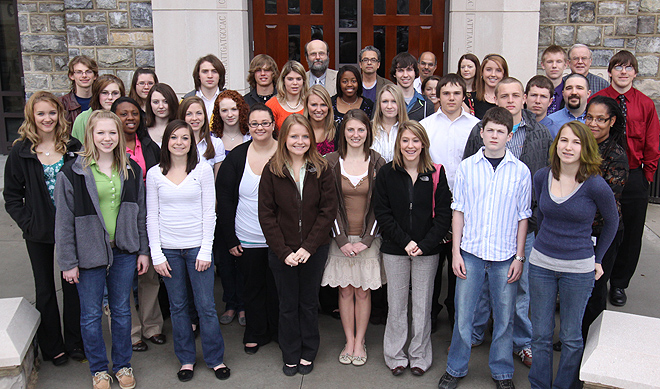Auburn High School students, teachers visit Virginia Bioinformatics Institute in conjunction with education and outreach project

A group of 35 students and two teachers from Auburn High School in Riner, Va., visited the Virginia Bioinformatics Institute at Virginia Tech for a daylong workshop on March 27, 2009, to learn more about the institute's cyberinfrastructure education and outreach program and participate in hands-on, bioinformatics-based activities.
The teachers, Charles Jervis and Mathew Beeken, are part of a group of educators partnering with the institute for the project, “CI-TEAM Implementation for Biological Researchers, Educators and Developers (CIBRED),” which is part of the Virginia Bioinformatics Institute’s education and outreach program in Cyberinfrastructure – Training, Education, Advancement and Mentoring (CI-TEAM).
Funded by a $918,000 grant from the National Science Foundation (NSF), the project involves partnerships with scientific researchers and high school and undergraduate educators from several institutions nationwide to build an educational program that will help prepare students for data-rich and cyber-savvy research environments where cyberinfrastructure systems, tools, and services are used effectively to fuel a knowledge-based economy.
Jervis and Beeken, along with the other scientists and educators involved in CIBRED, are creating a collection of educational modules that will help instructors teach students skills in team science using a project-centric approach in bioinformatics that removes the boundaries between different research disciplines to better understand specific scientific problems in an environment. The topic-specific modules complement various subjects, providing a flexible curriculum that can be integrated into different high school and college environments with varying educational requirements.
The group visiting the institute consisted of students interested in enrolling in advanced biology and statistic classes that will be offered by Auburn High School in the fall of 2009. The Virginia Bioinformatics Institute visit gave the students the opportunity to become more familiar with the kinds of modules being developed through CIBRED, some of which will be integrated into the advanced biology and statistics courses.
In addition to an overview of the CIBRED program, the students participated in two hands-on activities coordinated by Daphne Rainey, Virginia Bioinformatics Institute training, education and outreach program manager; and Julie Schulman, Virginia Bioinformatics Institute computational biologist for training and curriculum. For one activity, the students were presented with an influenza outbreak scenario in a major city in the United States. Assuming different roles, such as pharmacologist, epidemiologist, physician, and immunologist, the group worked together to share the knowledge gained in their “specialty” to develop a plan of action that could be distributed nationally, preventing further spread of the disease.
“It was a pleasure to welcome the students and teachers from Auburn High School to [the institute],” said Oswald Crasta, project director for the institute’s Cyberinfrastructure Group (CIG) and principal investigator of the CIBRED project. “This visit gave us the opportunity to introduce the students to the types of modules that will be used in the fall courses at the school, as well as gain important feedback from them about the activities to get a sense of what really peaks their interests.”
Crasta and CIBRED co-principal investigators Stephen Cammer and Rainey are collaborating with educators from National University Research Institute, Hampton University, Howard University, Virginia Tech, and several high schools in Virginia and California, including Jervis and Beeken from Auburn High School, to coordinate the curriculum design efforts.
CIBRED's new website provides an overview of the project, as well as detailed curriculum information. Through the website, high school, and college educators can view and download modules to be used in the classroom. The site also features information about the CIBRED core course framework and course discussion areas where users can discuss curriculum tools and provide suggestions for new classroom modules.




